Marinus van der Lubbe
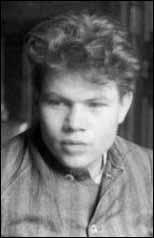
Marinus van der Lubbe was born in Leiden, on 13th January, 1909. His father, Franciscus Cornelis van der Lubbe, was a heavy drinker who left the family when he was seven years old. His mother died five years later. He was then raised by an older sister and was brought up in extreme poverty. His school report said he was a " talented boy of limited application". (1)
After leaving school Lubbe worked as a bricklayer but after an industrial accident, where both his eyes were damaged and in 1925 he spent five months in hospital. He never fully recovered and was now unable to work and had to live on a small invalidity pension. (2)
Van der Lubbe became interested in politics and spent most of his spare time reading and became a familiar figure in the Leyden Public Library. This included books by Karl Marx and in 1926 he joined the Communist Party of the Netherlands. "Needless to say, the foundation of his self-taught knowledge was rather shaky, so that his hatred of capitalism was based less on Marxist science than on his youthful enthusiasm and Utopian dreams of heaven and earth." (3)
Marinus van der Lubbe and Politics
Marinus van der Lubbe became chairman of the Leyden Communist Youth League in November 1928. "He wrote leaflets and edited factory and school pamphlets, in all of which he attacked militarism and capitalism; he was present at every strike meeting and political demonstration held in Leyden, and worked tirelessly for the revolutionary cause. His activities as public speaker and heckler soon made him a well-known figure, particularly among the unemployed, whom he led during a number of processions through the town." (4)
In 1931 van der Lubbe went travelling. That year he went to Yugoslavia and Rumania. The following year he visited Austria and Poland. In April 1932 he was arrested. He wrote to his friend, Koos Vink: "When you receive this letter, I shall have spent a whole week in a Polish prison. I was given three weeks, for illegal entry, and when my time is up I shall return to Holland." (5)
On his return he began mixing with different left-wing political groups. He rejected the political ideas of Joseph Stalin and became sympathetic to those of Leon Trotsky. He was also attracted to anarchist theories and eventually joined the Party of International Communists (sometimes known as Rade Communists). This party, which had only a handful of members in Holland, "was opposed to the very idea of discipline and leadership, and saw the salvation of the working class in spontaneous, individual action alone." (6)
In the General Election of November 1932, the German Communist Party (KPD) won 100 seats in the Reichstag. The Social Democratic Party (SDP). did slightly better with 121 seats but it was the Nazi Party with 196, that had the greatest success. However, when Adolf Hitler was appointed Chancellor, in January 1933, the Nazis only had a third of the seats in Parliament. (7)
Marinus van der Lubbe read about these events in the Dutch newspapers. He told his friend, Koos Vink, that he believed that Germany was on the verge of revolution. He decided he wanted to play a role in these events and on 3rd February 1933, he decided to walk to Berlin. He arrived fifteen days later. He was disappointed to discover that the KPD was not actively resisting Hitler's rule. He decided to take matters into his own hands by setting a number of public buildings on fire. "Perhaps once the intimidated masses saw these strongholds of capitalism going up in flames, they might shake off their lethargy even at this late hour." (8)
On the morning of 25th February, van der Lubbe, bought matches and four packets of firelighters. That night he tried to set fire to a public toilet, the town hall and the Imperial Palace. In each case, the fire was discovered soon afterwards and no real damage was done. (9)
Reichstag Fire
Three days later Marinus van der Lubbe successfully set-fire to the Reichstag building. Ian Kershaw has suggested that Lubbe was motivated by a sense of injustice: "He was... a solitary individual, unconnected with any political groups, but possessed of a strong sense of injustice at the misery of the working class at the hands of the capitalist system. In particular, he was determined to make a lone and spectacular act of defiant protest at the Government... in order to galvanize the working class into struggle against their repression." (10)
Marinus van der Lubbe was arrested in the building. Van der Lubbe was immediately interviewed by the Gestapo. According to Rudolf Diels: "A few of my department were already engaged in interrogating Marinus Van der Lubbe. Naked from the waist upwards, smeared with dirt and sweating, he sat in front of them, breathing heavily. He panted as if he had completed a tremendous task. There was a wild triumphant gleam in the burning eyes of his pale, haggard young face." (11)
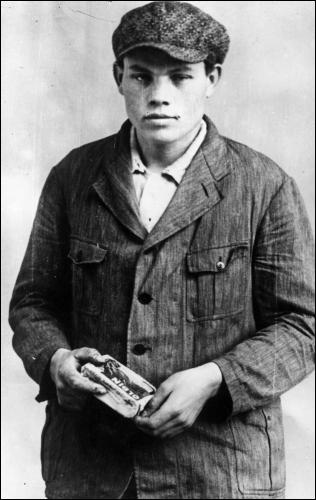
Detective-Inspector Walter Zirpins carried out the original investigation. At about 9.03 p.m., Hans Flöter, a young theology student, was walking past the south-western corner of the dark and deserted Reichstag when he heard the sound of breaking glass. When he turned round he saw a man with a burning object in his hand. He raced off and found a police officer, Sergeant Karl Buwert. When the two men reached the scene of the crime, they could see a man rushing from window waving a flaming torch.
Buwert was joined by several other policemen and eventually entered the building. It was Constable Helmut Poeschel who arrested van der Lubbe at 9.27. He later reported that he "was a tall, well-built young man, completely out of breath and dishevelled". Poeschel searched him and all he found was a "pocket knife, a wallet, and a passport". (12)
Marinus Van der Lubbe was interviewed by Zirpins. He admitted setting fire to the Reichstag but claimed that he had no connections with the German Communist Party (KPD) or the Social Democratic Party (SDP). However, back home in Leiden, he had supported a tiny Dutch political group called the "Rade or International Communists". On his arrival in Germany he talked to many people and was shocked to discover that the "workers will do nothing against a system which grants freedom to one side and metes out oppression to the other". He decided that since "the workers would do nothing, I had to do something by myself". (13)
Van der Lubbe took Detective-Inspector Helmut Heisig back to the Reichstag building. "Van der Lubbe led us. We neither indicated the direction nor influenced him in any way. He was almost delighted to show us the path he had taken. He said he had an excellent sense of direction because of his poor eyesight. Another sense had taken the place of his eyes." (14)
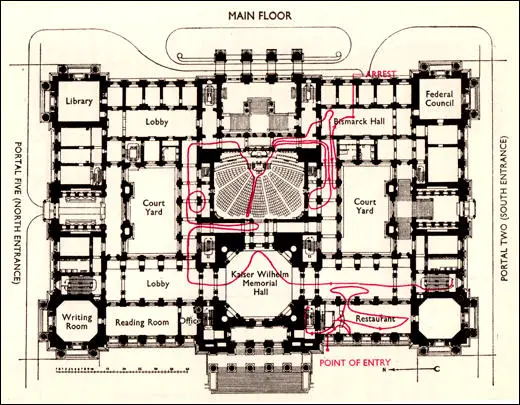
Foreign newspapers reported that the Nazi government had probably been behind the fire. Willi Frischauer, the Berlin correspondent for the Vienna newspaper, Wiener Allgemeine Zeitung, commented that on the night of the fire that he believed that the Nazis where behind the fire: "There can scarcely be any doubt that the fire which is now destroying the Reichstag was set by henchmen of the Hitler government. By all appearances, the arsonists used an underground passage connecting the Reichstag to the palace of its president, Hermann Göring." (15)
According to the first person who interviewed Marinus van der Lubbe he was "as silent as a wall" and that he was either "an idiot or one cool customer". Eventually the young Dutchman admitted that he had set fire to the Reichstag with firelighters and his own clothing. "The first fire went out. Then I lit my shirt on fire and carried it farther. I went through five rooms." (16)
Van der Lubbe denied that he was part of a Communist conspiracy and had no connections with the Social Democratic Party (SDP) or German Communist Party (KPD). He insisted that he acted alone and the burning of the Reichstag was his own idea. He went on to claim, "I do nothing for other people, all for myself. No one was for setting the fire." However, he hoped that his act of arson would lead the revolution. "The workers should rebel against the state order. The workers should think that it is a symbol for a common uprising against the state order." (17) Hermann Göring, who was in control of the investigation, ignored what van der Lubbe had said and on 28th February, he made a statement stating that he had prevented a communist uprising. (18)
On 3rd March, van der Lubbe made a full confession: "I myself am a Leftist, and was a member of the Communist Party until 1929. I had heard that a Communist demonstration was disbanded by the leaders on the approach of the police. In my opinion something absolutely had to be done in protest against this system. Since the workers would do nothing, I had to do something myself. I considered arson a suitable method. I did not wish to harm private people but something belonging to the system itself. I decided on the Reichstag. As to the question of whether I acted alone, I declare emphatically that this was the case." (19)
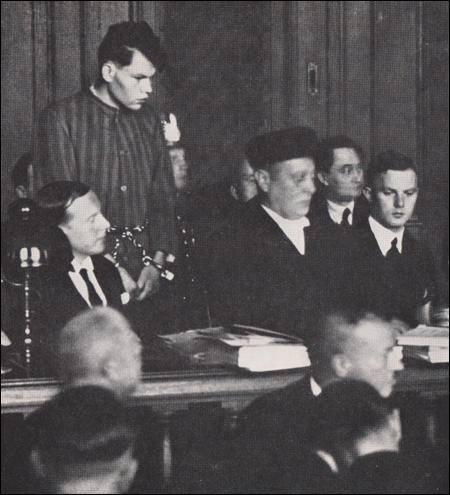
On 9th March, 1933, three Bulgarians, Georgi Dimitrov, Blagoi Popov and Vassili Tanev, were also arrested after a suspicious waiter informed the police that they had been acting strangely. Dimitrov had been a trade union activist before helping to form the Bulgarian Communist Party in 1919. Dimitrov went to live in the Soviet Union but in 1929 he moved to Berlin where he became head of the Central European section of Comintern. (20) However, the Nazi government was unaware that Dimitrov was one of the most important figures in the "international Communist movement". (21)
Detective-Inspector Walter Zirpins became convinced that these men had told van der Lubbe to carry out the attack on the Reichstag. "I am convinced that he (Marinus van der Lubbe) did it all by himself... A man who is willing to carry out revolutionary intrigues on his own account is just what the Communist Party needs. In the Party's hands, van der Lubbe became a willing tool, one who, while believing he was shifting for himself, was being shifted from behind the scenes. No wonder then that the Communist Party was so delighted to use him." (22)
Reichstag Fire Trial
Marinus van der Lubbe, Ernst Torgler, Georgi Dimitrov, Blagoi Popov and Vassili Tanev were indicted on charges of setting the Reichstag on fire. The trial began on 21st September, 1933. The presiding judge was Judge Dr. Wilhelm Bürger of the Supreme Court. The accused were charged with arson and with attempting to overthrow the government. (23)
Douglas Reed, a journalist working for The Times, described the defendants in court. "A being (Marinus van der Lubbe) of almost imbecile appearance, with a shock of tousled hair hanging far over his eyes, clad in the hideous dungarees of the convicted criminal, with chains around his waist and wrists, shambling with sunken head between his custodians - the incendiary taken in the act. Four men in decent civilian clothes, with intelligence written on every line of their features, who gazed somberly but levelly at their fellow men across the wooden railing which symbolized the great gulf fixed between captivity and freedom.... Torgler, last seen by many of those present railing at the Nazis from the tribune of the Reichstag, bore the marks of great suffering on his fine and sensitive face. Dimitrov, whose quality the Court had yet to learn, took his place as a free man among free men; there was nothing downcast in his bold and even defiant air. Little Tanev had not long since attempted suicide, and his appearance still showed what he had been through, Popov, as ever, was quiet and introspective." (24)
Professor Emile Josse, lecturer on thermodynamics at the Berlin Technical College, argued in court that Marinus van der Lubbe could not have set fire to the Reichstag on his own. Georgi Dimitrov, who was defending himself in court, commented: "I am glad that the experts too are of the opinion that van der Lubbe could not have acted all by himself. This is the only point in the indictment with which I am in complete accord... I wish once more and for the last time to ask van der Lubbe. As was already said, he was not alone. His conduct, his silence makes it possible for innocent people to be accused along with him. I would not ask van der Lubbe about his accomplices, had his act been revolutionary, but it is counter-revolutionary." Van der Lubbe refused to answer. (25)
Van der Lubbe admitted that he had made three failed attempts at arson on 25th February in different buildings in Berlin. Dimitrov asked van der Lubbe: "Why were you unable to set fire to the small charity institution, yet managed to set fire to the large stone building of the Reichstag, and in just a quarter of an hour at that?... The Communist International demands full clarity on the question of the Reichstag fire. Millions are waiting for an answer!" (26)
On the 6th December, 1933, Time Magazine reported that Marinus van der Lubbe had made an important confession: "Marinus van der Lubbe, who has sat as though drugged or stupefied for weeks on end, suddenly leaped to his feet, clear-eyed and bubbling with protests which he hurled at Presiding Judge Dr. Wilhelm Bünger." The magazine reported that van der Lubbe shouted: "This trial began in Leipzig, then moved to Berlin, and now we are back in Leipzig but nothing ever happens. I don't agree to that! I burned down the Reichstag and I want to have my sentence - twenty years in prison or Death! I have been questioned for over eight months. I want something to happen! This trial has now been going on for two months. How long is it going to take to get a verdict?" The Chief Prosecutor stated: "This trial has lasted so long because you will not reveal your accomplices." Lubbe replied, "I set the fire. None of these other defendants had anything to do with it." (27)
Douglas Reed, reporting the trial for The Times, commented: "Attempts from all sides of the court to wrest from van der Lubbe the secret of his accomplices, however, were parried in a manner that indicted either great cunning or the sincere conviction that he had none... There remained only two possibilities - that van der Lubbe had no accomplices or that he did not himself know who they were. The one man from whom, it had been thought, the secret might yet be wrested, either would not yield it or had none to yield." (28)
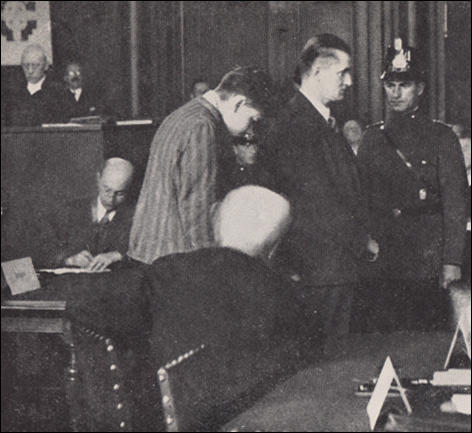
On 16th December, 1933, Georgi Dimitrov was allowed to make his final speech to the court. "I am defending myself, an accused Communist. I am defending my political honour, my honour as a revolutionary. I am defending my Communist ideology, my ideals. I am defending the content and significance of my whole life. For these reasons every ward which I say in this Court is a part of me, each phrase is the expression of my deep indignation against the unjust accusation, against the putting of this anti-Communist crime, the burning of the Reichstag, to the account of the Communists."
Dimitrov also attacked Marinus van der Lubbe: "What is van der Lubbe? A Communist? Inconceivable. An Anarchist? No. He is a declassed worker, a rebellious member of the scum of society. He is a misused creature who has been played off against the working class. No, he is neither a Communist nor an Anarchist. No Communist, no Anarchist anywhere in the world would conduct himself in Court as van der Lubbe has done. Genuine Anarchists often do senseless things, but invariably when they are haled into Court they stand up like men and explain their aims. If a Communist had done anything of this sort, he would not remain silent knowing that four innocent men stood in the dock alongside him. No, van der Lubbe is no Communist. He is no Anarchist; he is the misused tool of fascism." (29)
Execution of Marinus van der Lubbe
On 23rd December, 1933, Judge Wilhelm Bürger announced that Marinus van der Lubbe was guilty of "arson and with attempting to overthrow the government". Bürger concluded that the German Communist Party (KPD) had indeed planned the fire in order to start a revolution, but the evidence against Ernst Torgler, Georgi Dimitrov, Blagoi Popov and Vassili Tanev, was insufficient to justify a conviction. (30)
On 9th January, 1934, when the Public Prosecutor informed Marinus van der Lubbe that his appeal for clemency had been rejected, and that he was to be beheaded the following morning, he answered: "Thank you for telling me: I shall see you tomorrow." When he was led out of his cell, he looked calm and peaceful. Judge Wilhelm Bürger attended and saw the executioner, who was dressed in tails, top hat and white gloves, carried out the beheading. (31)
In 1960, Fritz Tobias, a retired civil servant, published a series of articles in Der Spiegel, later turned into a book, The Reichstag Fire: Legend and Truth (1963), in which he argued that Marinus van der Lubbe acted alone. Tobias pointed out that the actions taken by the Nazi government after the Reichstag Fire shows that they were not responsible: "Today there seems little doubt that it was precisely by allowing van der Lubbe to stand trial that the Nazis proved their innocence of the Reichstag fire. For had van der Lubbe been associated with them in any way, the Nazis would have shot him the moment he had done their dirty work, blaming his death on an outbreak of 'understandable popular indignation'. Van der Lubbe could then have been branded a Communist without the irritations of a public trial, and foreign critics would not have been able to argue that, since no Communist accomplices were discovered, the real accomplices must be sought on the Government benches". (32)
The family of Marinus van der Lubbe attempted to rehabilitate him. In 1967 a Berlin court changed the sentence to an eight-year prison term. In 1980 the same court lifted the sentence completely, a decision later reversed by the federal court. Then in 1981 a West German court overturned the conviction on the basis that van der Lubbe was insane, but campaigners pushed for full state pardon arguing that he had been convicted by a Nazi court. It was not until January, 2008, that he was granted a pardon, based on the concept that Nazi law "went against the basic ideas of justice". (33)
Primary Sources
(1) Marinus van der Lubbe, statement to police (3rd March, 1933)
I myself am a Leftist, and was a member of the Communist Party until 1929. I had heard that a Communist demonstration was disbanded by the leaders on the approach of the police. In my opinion something absolutely had to be done in protest against this system. Since the workers would do nothing, I had to do something myself. I considered arson a suitable method. I did not wish to harm private people but something belonging to the system itself. I decided on the Reichstag. As to the question of whether I acted alone, I declare emphatically that this was the case.
(2) Rudolf Diels arrived at the Reichstag soon after it had been set on fire on 27th February 1933.
Shortly after my arrival in the burning Reichstag, the National Socialist elite had arrived. On a balcony jutting out of the chamber, Hitler and his trusty followers were assembled. As I entered, Goering came towards me. His voice was heavy with the emotion of the dramatic moment: "This is the beginning of the Communist Revolt, they will start their attack now! Not a moment must be lost."
Goering could not continue. Hitler turned to the assembled company. Now I saw that his face was purple with agitation and with the heat. He shouted uncontrollably, as I had never seen him do before, as if he was going to burst: "There will be no mercy now. Anyone who stands in our way will be cut down. The German people will not tolerate leniency. Every communist official will be shot where he is found. Everybody in league with the Communists must be arrested. There will also no longer be leniency for social democrats.
(3) Rudolf Diels was in charge of interrogating Marinus van der Lubbe after the Reichstag Fire.
A few of my department were already engaged in interrogating Marinus Van der Lubbe. Naked from the waist upwards, smeared with dirt and sweating, he sat in front of them, breathing heavily. He panted as if he had completed a tremendous task. There was a wild triumphant gleam in the burning eyes of his pale, haggard young face.
The voluntary confessions of Marinus Van der Lubbe prevented me from thinking that an arsonist who was such an expert in his folly needed any helpers. He had been so active that he had laid several dozen fires. With a firelighter he had set the chamber aflame. Then he had rushed through the big corridors with his burning shirt which he brandished in his right hand like a torch. During the hectic activity he was overpowered by Reichstag officials. I reported on the results of the first interrogations of Marinus Van der Lubbe - that in my opinion he was a maniac. But with this opinion I had come to the wrong man; Hitler ridiculed my childish view.
(4) Georgi Dimitrov, cross-examing Marinus van der Lubbe and Professor Emile Josse (23rd October, 1933)
Dimitrov: I am glad that the experts too are of the opinion that van der Lubbe could not have acted all by himself. This is the only point in the indictment with which I am in complete accord. But I go farther. According to me, at this trial van der Lubbe is, as it were, the Faustus of the Reichstag fire. This miserable Faustus has been brought before the Court, but the Mephistopheles of the fire is not here...
President: Now is not the time for pleading...
Dimitrov: Was it at all possible for van der Lubbe to cover the distance from the place of the fire and set fire to the hall?
Josse: At his arrest van der Lubbe was panting for breath and was all in sweat. Taking into consideration his agility, which was known to those who had known him before, in the course of this time he could all by himself have kindled the fire prepared beforehand.
Dimitrov: If I have correctly understood his words, the expert presumes the presence of at least two incendiaries?
Josse: Yes. (Van der Lubbe comes forward, and the interpreter translates for him in brief the depositions of Prof. Josse).
President: Raise your head, van der Lubbe! Do You understand what has been said? The expert who is a learned professor says that you could not have set fire to the Reichstag all by Yourself. Who prepared the fire? Answer! (Van der Lubbe persists in his silence).
Dimitrov (Addressing van der Lubbe as the latter is being led past him to take his seat): This miserable Faustus must tell us the name of his Mephistopheles! Mr. President ...
President: Dimitrov, you cannot go on talking all the time. I can allow you to put just one question.
Dimitrov: I wish once more and for the last time to ask van der Lubbe. As was already said, he was not alone. His conduct, his silence makes it possible for innocent people to be accused along with him. I would not ask van der Lubbe about his accomplices, had his act been revolutionary, but it is counter-revolutionary.
President: That is enough. Ask just one question.
Dimitrov: Is it true that while setting the fire van der Lubbe passed along the course as indicated or not?
President: He has said that a hundred times already.
Dimitrov: Has van der Lubbe set fire to the hall all by himself?
President: He has already answered this question. This is the last question which I authorize.
Dimitrov: He said here that he ran through the hall with a piece of burning material in his hand - was that so? (The President asks the interpreter to translate the question to van der Lubbe).
Van der Lubbe: I cannot say this, exactly.
(5) Adolf Hitler, statement made in 1941
Marinus van der Lubbe, the man who started the fire, ought to have been hanged within three days, if only because he was seen carrying a parcel from Torgler's house on the day of the fire. Had we made short shrift of him, we should also have been able to convict the real instigator, Dimitrov, who is now the head of the GPU in the Soviet Union.
(6) Fritz Tobias, The Reichstag Fire: Legend and Truth (1963)
Today there seems little doubt that it was precisely by allowing van der Lubbe to stand trial that the Nazis proved their innocence of the Reichstag fire. For had van der Lubbe been associated with them in any way, the Nazis would have shot him the moment he had done their dirty work, blaming his death on an outbreak of `understandable popular indignation'. Van der Lubbe could then have been branded a Communist without the irritations of a public trial, and foreign critics would not have been able to argue that, since no Communist accomplices were discovered, the real accomplices must be sought on the Government benches.
(7) Seftan Delmer, Der Spiegel (25th November, 1959)
That evening, Hitler himself was not yet absolutely certain that thefire was a Communist plot. This became clear from what he said to me as we walked side by side through the burning building. "God grant," he said, "that this be the work of the Communists. You are now witnessing the beginning of a great new epoch in German history." That was the first clue. Hitler did not say, "This is the work of the Communists", but, "God grant this be the work of the Communists." And a little later, when von Papen appeared, Hitler seized his hand, pumped it with much unbecoming enthusiasm, and said: "This is a God-given signal, Herr Vice-Chancellor ! If this fire, as I believe, is the work of the Communists, then we must crush out this murder pest with an iron fist." It must be granted that what I saw of Hitler's and Goebbels's behaviour in the Reichstag does not fit in with the theory that both were party or even privy to the Reichstag fire plot.
(8) Kate Connolly, The Guardian (12th January, 2008)
An unemployed Dutch bricklayer who was made a scapegoat for one of the defining moments of 20th-century German history has been pardoned for his crime 75 years later.Marinus van der Lubbe, 24, was beheaded after being convicted of setting fire to the Reichstag, an event Hitler used as a pretext to suspend civil liberties and establish a dictatorship.
But Van de Lubbe's conviction has been overturned by the federal prosecutor, Monika Harms, after a lawyer in Berlin alerted her to the fact that he had yet to be exonerated under a law passed in 1998. The law allowed pardons for people convicted of crimes under the Nazis, based on the concept that Nazi law "went against the basic ideas of justice".
Following the attack in February 1933, which gutted the Reichstag and was a key event in the establishment of Nazi Germany, the Communist party was banned and Nazi opponents were brutally suppressed. In one night 1,500 communist functionaries were arrested.
When he was alerted to the news of the fire, which took place shortly after he had taken power, Adolf Hitler called it a "sign from heaven" that a communist putsch was about to be launched.
The day after the fire the Reichstag fire decree was signed into law, which led to the suspension of civil liberties and the banning of many newspapers and other publications hostile to the Nazis.
The full pardon follows a decades-long legal process by Van der Lubbe's heirs to rehabilitate him.
In 1967 a Berlin court bizarrely changed the sentence to an eight-year prison term. In 1980 the same court lifted the sentence completely, a decision later reversed by the federal court. Then in 1981 a West German court overturned the conviction on the basis that Van der Lubbe was insane, but campaigners pushed for full state pardon arguing that he had been convicted by a Nazi court.
Student Activities
Adolf Hitler's Early Life (Answer Commentary)
Adolf Hitler and the First World War (Answer Commentary)
Adolf Hitler and the German Workers' Party (Answer Commentary)
Sturmabteilung (SA) (Answer Commentary)
Adolf Hitler and the Beer Hall Putsch (Answer Commentary)
Adolf Hitler the Orator (Answer Commentary)
An Assessment of the Nazi-Soviet Pact (Answer Commentary)
British Newspapers and Adolf Hitler (Answer Commentary)
Lord Rothermere, Daily Mail and Adolf Hitler (Answer Commentary)
Adolf Hitler v John Heartfield (Answer Commentary)
The Hitler Youth (Answer Commentary)
German League of Girls (Answer Commentary)
Night of the Long Knives (Answer Commentary)
The Political Development of Sophie Scholl (Answer Commentary)
The White Rose Anti-Nazi Group (Answer Commentary)
Kristallnacht (Answer Commentary)
Heinrich Himmler and the SS (Answer Commentary)
Trade Unions in Nazi Germany (Answer Commentary)
Hitler's Volkswagen (The People's Car) (Answer Commentary)
Women in Nazi Germany (Answer Commentary)
